|
|
|
Sort Order |
|
|
|
Items / Page
|
|
|
|
|
|
|
| Srl | Item |
| 1 |
ID:
183448
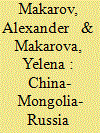

|
|
|
|
|
| Summary/Abstract |
The 100th anniversary of the establishment of diplomatic relations between Russia and Mongolia, which the two neighboring countries will celebrate on November 5, 2021, provides cause to assess the current state of bilateral cooperation, existing problems and prospects for its development.
In recent years, the intensification of Russian-Mongolian relations has been considered in the context of the trilateral Program for the Creation of the China-Mongolia-Russia Economic Corridor. Despite the lack of certain results at the moment, implementation of a number of infrastructure projects is being prepared as part of this program, which should significantly strengthen the economic base of Russia's cooperation with Mongolia and China.
This article analyzes problems of implementing plans for developing transportation and energy infrastructure through Mongolia, which are considered the basis for trilateral cooperation. Particular attention is paid to plans for developing railroad networks. Promising areas for improving transborder infrastructure within the framework of Mongolian corridor program are highlighted.
|
|
|
|
|
|
|
|
|
|
|
|
|
|
|
|
| 2 |
ID:
089321
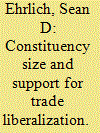

|
|
|
|
|
| Publication |
2009.
|
| Summary/Abstract |
Studies of the political economy of trade frequently rely on the assumption that the larger a policy maker's constituency, the more supportive of free-trade that policy maker will be. Large constituencies are supposed to yield concern for the national interest and provide insulation from particularistic, protectionist interests. This assumption, though, has rarely been directly tested. This article does so by leveraging the variation in district size within the U.S. Congress. This article statistically examines a dataset of roll-call votes on trade legislation from 1994 to 2004 to determine the effect of constituency size and alternative explanations for legislative preferences on foreign economic policy and finds no evidence of the effect of constituency size.
|
|
|
|
|
|
|
|
|
|
|
|
|
|
|
|
| 3 |
ID:
093860
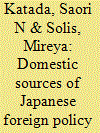

|
|
|
|
|
| Publication |
2010.
|
| Summary/Abstract |
The conventional view in the field of international political economy - that greater economic interdependence creates an incentive for active foreign policy engagement - is hard to reconcile with Japan's foreign economic policy. To explain this counterintuitive outcome, we develop a new model of domestic demand for policy activism that integrates strands of prospect theory, collective action, and interest aggregation. We argue that both the rationale for mobilization and lobbying capacity are essential elements in understanding the domestic demand for significant foreign policy departures. We apply this conceptual framework to Japanese foreign economic policy in two issue areas: finance (Japan's response to the 1980s Latin American debt crisis and the late 1990s Asian Financial Crisis), and trade (Japan's Free Trade Agreement negotiations with Mexico and South Korea).
|
|
|
|
|
|
|
|
|
|
|
|
|
|
|
|
| 4 |
ID:
089547


|
|
|
|
|
| Publication |
2009.
|
| Summary/Abstract |
Norway's "Government Pension Fund" - Global (GPF-G) is large (around $400b), portfolio oriented and transparent. It tries to be ethical and has been mooted as a role model for other SWFs. The way the GPF-G is set up undergirds the US vision of a financialised world economy and it even indirectly supports US warfare in Iraq by buying treasury bills. It is also a leader in ethical investments - more than 20 private funds piggyback any divestment decision the GPF-G makes. Understanding the international implications of the GPF-G does not, however, amount to an explanation of why this vehicle was created. This article puts forward the argument that if we want to understand why and how these diverse behaviours cohere into a larger strategic whole, the fund must be interpreted as the continuation and technocratisation of a long established corporatist tradition of foreign economic policy that Peter Katzenstein more than 25 years ago labelled a strategy of flexible adjustment and domestic compensation.
|
|
|
|
|
|
|
|
|
|
|
|
|
|
|
|
| 5 |
ID:
060074
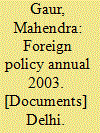

|
|
|
|
|
| Publication |
DelhI, Kalpaz Publications, 2005.
|
| Description |
352p. Part II
|
| Contents |
This book is in two part.
Part I : Events
Part II: Documents
|
| Standard Number |
8178353997
|
|
|
|
|
|
|
|
|
|
|
|
Copies: C:1/I:0,R:0,Q:0
Circulation
| Accession# | Call# | Current Location | Status | Policy | Location |
| 049389 | 327.11/GAU 049389 | Main | On Shelf | General | |
|
|
|
|
| 6 |
ID:
060075
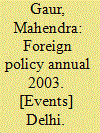

|
|
|
|
|
| Publication |
DelhI, Kalpaz Publications, 2005.
|
| Description |
328p. Part I
|
| Contents |
This book is in two Part
Part I : Events
Part II : Documents
|
| Standard Number |
8178353989
|
|
|
|
|
|
|
|
|
|
|
|
Copies: C:1/I:0,R:0,Q:0
Circulation
| Accession# | Call# | Current Location | Status | Policy | Location |
| 049388 | 327.11/GAU 049388 | Main | On Shelf | General | |
|
|
|
|
| 7 |
ID:
145542
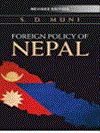

|
|
|
|
|
| Publication |
New Delhi, Adroit Publishers, 2016.
|
| Description |
v, 312p.hbk
|
| Standard Number |
9788187393344
|
|
|
|
|
|
|
|
|
|
|
|
Copies: C:1/I:0,R:0,Q:0
Circulation
| Accession# | Call# | Current Location | Status | Policy | Location |
| 058690 | 327.105496/MUN 058690 | Main | On Shelf | General | |
|
|
|
|
| 8 |
ID:
100406


|
|
|
| 9 |
ID:
137613
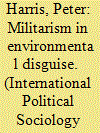

|
|
|
|
|
| Summary/Abstract |
What is the relationship between militarized landscapes, especially overseas military bases, and the natural environment? Scholars have noticed that militarized spaces—permanent bases, demilitarized zones, live fire ranges, training areas, historical battlefields and so forth—are often accompanied by de facto nature reserves. Thus, the unparalleled seclusion that militarization imposes upon delineated geographic spaces can create safe havens for plants and animals that would otherwise suffer from human encroachment. Others retort that military activities cause severe damage to the natural environment. In this article, I problematize attempts to evaluate the environmental impact of militarized spaces in a way that divorces the natural environment from the broader web of social and political relations to which military activities belong. In particular, I argue that environmental issues often serve as “greenwash” to distract attention—lay, scholarly, and official—from the negative aspects of militarism, including instances of environmental degradation, the mistreatment of human subjects, and the perpetuation of colonial forms of government. To illustrate and buttress my argument, I present a detailed case study of the US military base on Diego Garcia in the British Indian Ocean Territory.
|
|
|
|
|
|
|
|
|
|
|
|
|
|
|
|
| 10 |
ID:
154689
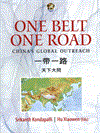

|
|
|
|
|
| Publication |
New Delhi, Pentagon Press, 2017.
|
| Description |
xvi, 438p.: tables, figures, mapshbk
|
| Standard Number |
9789386618030
|
|
|
|
|
|
|
|
|
|
|
|
Copies: C:1/I:0,R:0,Q:0
Circulation
| Accession# | Call# | Current Location | Status | Policy | Location |
| 059158 | 337.51/KON 059158 | Main | On Shelf | General | |
|
|
|
|
| 11 |
ID:
026472


|
|
|
|
|
| Publication |
London, C.Horst and Company, 1976.
|
| Description |
xvi, 288p.hbk
|
| Standard Number |
0903983494
|
|
|
|
|
|
|
|
|
|
|
|
Copies: C:1/I:0,R:0,Q:0
Circulation
| Accession# | Call# | Current Location | Status | Policy | Location |
| 016201 | 947.085/BER 016201 | Main | On Shelf | General | |
|
|
|
|
| 12 |
ID:
164159
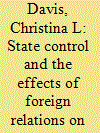

|
|
|
|
|
| Summary/Abstract |
Can governments still use trade to reward and punish partner countries? While World Trade Organization (WTO) rules and the pressures of globalization restrict states’ capacity to manipulate trade policies, politicization of trade is likely to occur where governments intervene in markets. We examine state ownership of firms as one tool of government control. Taking China and India as examples, we use new data on bilateral trade disaggregated by firm ownership type as well as measures of political relations based on bilateral events and United Nations voting data to estimate the effect of political relations on import flows since the early 1990s. Our results support the hypothesis that imports controlled by state-owned enterprises are more responsive to political relations than imports controlled by private enterprises. This finding suggests that politicized import decisions will increase as countries with partially state-controlled economies gain strength in the global economy. Extending our analysis to exports for comparison, we find a similar pattern for Indian but not for Chinese exports and offer potential explanations for these differential findings.
|
|
|
|
|
|
|
|
|
|
|
|
|
|
|
|
| 13 |
ID:
028676
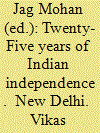

|
|
|
|
|
| Publication |
New Delhi, Vikas Publishing House, 1973.
|
| Description |
xix, 343p.hbk
|
| Standard Number |
706902378
|
|
|
|
|
|
|
|
|
|
|
|
Copies: C:1/I:0,R:0,Q:0
Circulation
| Accession# | Call# | Current Location | Status | Policy | Location |
| 011407 | 954.04/JAG 011407 | Main | On Shelf | General | |
|
|
|
|
| 14 |
ID:
092158


|
|
|
|
|
| Publication |
2009.
|
| Summary/Abstract |
Though the United States remains atop the world's power hierarchy, it is becoming less dominant, both because of the rise of new power centers and because the problems are becoming larger. The United States now must function in a world of relatively greater power equality and ever-larger problems springing from interdependence. The United States and China now have to look each other straight in the eyes, with the core of their relationship resting on the strategic foundation of stabilization-stabilization of the global economy, global ecosystem, and global security. This essay makes several additional points: (1) China has made some wise domestic and foreign economic policy decisions in the context of the great economic downturn of 2007-2009 that probably will increase the PRC's relative capacities coming out of the downturn; (2) US-China relations are more fundamentally sound than they have ever been before. Both nations' leaders should seize this opportunity to recast their relationship as partners in the effort to build coalitions to address the global system's most pressing challenges; and (3), even with a relatively sound strategic foundation for bilateral relations, when one moves from the general to the specific in important policy domains, it will be exceedingly difficult for Beijing and Washington to reach agreements on how to proceed on many key issues.
|
|
|
|
|
|
|
|
|
|
|
|
|
|
|
|
|
|
|
|
|